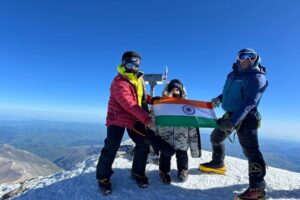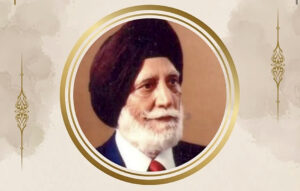In another embarrassing incident for Nepal’s beleaguered tourism industry, the giant outfitter Seven Summit Treks (SST) was fined US$44,000 for taking two climbers up Mount Everest without a permit.
The climbing permit was issued last April to an expedition run by SST. In July, Department of Tourism officials discovered a second false permit submitted for the same expedition with an additional two names. This second permit used the proper tourism letterhead and seal but was not valid.

The forged permit for 14 climbers. Photo: The Himalayan Times.
The additional climbers were well-known Australian Ian James Hibbert (67), and Xu Zhong Zhou (62) of China. Hibbert has climbed approximately 150 mountains over five decades and Xu Zhong is a professional mountaineer.
Local trekking companies charge foreigners between US$40,000 and US$100,000 for a spring Everest climb. This includes a Department of Tourism charge of US$11,000 per climber for the official permit.
Mingma Sherpa, the chairman of SST, denied any wrongdoing but confirmed that Hibbert and Xu Zhong were part of the expedition. He claims his company was a victim of a rogue former employee, who committed the forgery to pocket the fees, possibly in collusion with the climbers and/or tourism officials.
“We don’t even think about doing such acts, as our company is the largest and pays millions of rupees in royalties to the government each season,” he said.

Mingma Sherpa, Chairman Seven Summits Treks. Photo: Seven Summits Treks
The Nepal police are investigating the incident. Under new laws, both those responsible for the forgery and those who knowingly use the forged documents risk fines and up to seven years jail.
This incident is the latest in a number of fraudulent activities plaguing the tourist industry in Nepal. Recently, insurance companies have threatened to stop issuing policies to tourists, due to widespread fraud involving trekking firms, helicopter charters and hospitals in rescue and medical services. Read more here.
Last year, SST had a public spat with a U.S. evacuation company, Global Rescue, over non-payment and other irregularities, including failing to notify them before a rescue takes place.
In a statement to alanarnette.com, Global Rescue’s Dan Richards said, “Seven Summits refuses to [notify them] and instead relies on their own Sherpas and helicopters to perform their rescue and transport missions. This is a direct conflict of interest, and given their business practices, not something we can be involved with.”
Alan Arnette weighed in on the permit issue. “Sadly, this type of controversy is not unusual in Nepal… Corruption and bribes are common. It is well known that to get a climbing permit, it is customary to take officials to “lunch.” Everest Inc. is, in fact, a large, complex business filled with opportunities for unscrupulous characters. When the people charged with the oversight are in on the scam, it becomes impossible for real change to take place.”
According to Transparency International’s World Corruption Perception Index, Nepal is rated at 122 out of 180 countries in terms of corruption, scoring 31 out of 100. A score of 100 indicates “highly clean” and a score of 0 indicates “highly corrupt”. According to the 2017 survey, New Zealand was the cleanest nation with a score of 89 and Somalia was the most corrupt with a score of just 9 out of 100.





